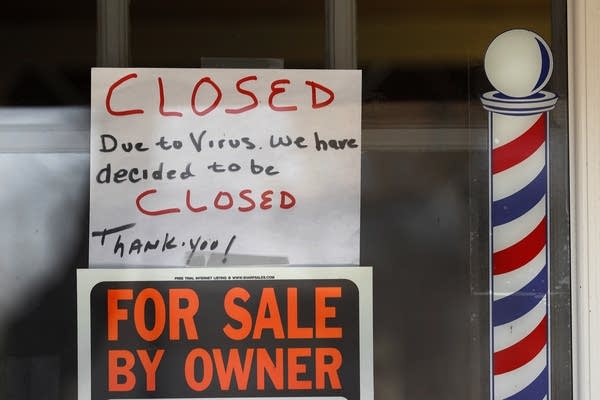Experts on reopening the economy: ‘There’s so much uncertainty’

Go Deeper.
Create an account or log in to save stories.
Like this?
Thanks for liking this story! We have added it to a list of your favorite stories.
Uncertainty over the economy is weighing heavily on millions of Americans, even as talk of reopening some businesses has dominated discussions at state capitols and the White House.
Right now, economists don’t have many answers.
“None of us knows how long this is going to go on because we don’t know how the virus is going to progress and how the health care system will be able to respond to it and hopefully get ahead of it,” said Neel Kashkari, president of the Federal Reserve Bank of Minneapolis.
Kashkari talked with MPR News host Kerri Miller and Marketplace’s Sabri Ben-Achour during a national call-in special about COVID-19’s effects on the global economy.
Turn Up Your Support
MPR News helps you turn down the noise and build shared understanding. Turn up your support for this public resource and keep trusted journalism accessible to all.
Despite the deluge of bad economic news, there’s been a bright spot, of sorts, for Kashkari: Political leaders have put partisan differences aside and agreed to support the American people through relief packages, he said.
That’s involved three packages so far — funding for testing and health agencies, the “Families First” package and the CARES Act. Meanwhile, lawmakers are at work on a fourth one.
“The Fed — we’re doing our part to make sure the financial system is working, but Congress is playing a very, very important role,” Kashkari said. “I expect they will continue to play that role.”
Here are a few takeaways from our conversation with Kashkari:
On which industries are struggling: The retail and service industries are among the hardest hit, Kashkari said. “These are not our highest paid members of society and they’re the ones who tend to be on the lower end or end up losing their jobs,” he said. “It’s not at all fair the way this is playing out.”
On lessons from administering the Troubled Asset Relief Program in 2008 for today: Kashkari served as the U.S. Treasury official who managed the Troubled Asset Relief Program during the 2008 financial crisis. He noted that they tried to target efforts to help certain homeowners in 2008, but by doing that, the support was too slow and didn’t help very many people.
“The lesson of that is we have to err on the side of being much more generous this time, and I think Congress has taken that to heart,” he said. “One of the challenges with all these programs: You have to reach millions and millions of people. It’s really complicated and it’s really complicated to do that fast.”
On oversight of the financial stimulus process: In recent days, Democrats in Congress have raised concerns about who will oversee the management of stimulus funds.
During his time administering TARP funds, Kashkari said, there were four different oversight bodies in addition to Congress. “There were times when we literally had more overseers than we had workers doing work,” Kashkari noted, adding that he thinks oversight is important. But so are policy choices.
“There’s great pressure on, ‘Hey, make sure each dollar is wisely spent,’ and I think in 2008, in some ways, we were pennywise and pound foolish and we didn’t help as many people as we can,” he said. “I think in this crisis, so many small businesses, so many workers are being affected, we need to just be generous and help as many as we possibly can and if we spend a little extra, so be it. The crisis will be less severe for all of us.”On how — and when — to reopen the economy: While President Trump and state governors debate who gets to reopen the economy and when, Kashkari said it’s a decision that rests with all of us.
“It’s when we feel comfortable taking our families and going back to a restaurant or going to a movie theater or going to a ball game or going to the theater,” he said. He predicts it could be a long time before that happens.“Until we get the vaccine or some therapy that we all have confidence in, that it’s safe to go back to normal, I think we’re in for a long bumpy road,” Kashkari said. “We definitely want to get the economy reopened, but it’s probably not going to all reopen at once.”
That reopening, he thinks, could be a slow one — business by business — to avoid a virus flare-up.
“There’s no easy answer, and that’s what we’re all struggling with,” he said.
To listen to the full conversation you can use the audio player above.
Subscribe to the MPR News with Kerri Miller podcast on: Apple Podcasts, Google Podcasts , Spotify or RSS.




